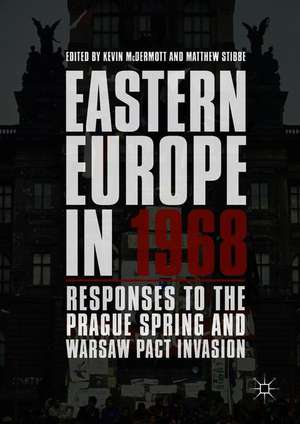Eastern Europe in 1968: Responses to the Prague Spring and Warsaw Pact Invasion
Editat de Kevin McDermott, Matthew Stibbeen Limba Engleză Hardback – 11 iun 2018
| Toate formatele și edițiile | Preț | Express |
|---|---|---|
| Paperback (1) | 727.97 lei 6-8 săpt. | |
| Springer International Publishing – 26 dec 2018 | 727.97 lei 6-8 săpt. | |
| Hardback (1) | 860.53 lei 6-8 săpt. | |
| Springer International Publishing – 11 iun 2018 | 860.53 lei 6-8 săpt. |
Preț: 860.53 lei
Preț vechi: 1049.42 lei
-18% Nou
Puncte Express: 1291
Preț estimativ în valută:
164.66€ • 172.27$ • 136.79£
164.66€ • 172.27$ • 136.79£
Carte tipărită la comandă
Livrare economică 02-16 aprilie
Preluare comenzi: 021 569.72.76
Specificații
ISBN-13: 9783319770680
ISBN-10: 3319770683
Pagini: 290
Ilustrații: XXIII, 311 p.
Dimensiuni: 148 x 210 x 26 mm
Greutate: 4.26 kg
Ediția:1st ed. 2018
Editura: Springer International Publishing
Colecția Palgrave Macmillan
Locul publicării:Cham, Switzerland
ISBN-10: 3319770683
Pagini: 290
Ilustrații: XXIII, 311 p.
Dimensiuni: 148 x 210 x 26 mm
Greutate: 4.26 kg
Ediția:1st ed. 2018
Editura: Springer International Publishing
Colecția Palgrave Macmillan
Locul publicării:Cham, Switzerland
Cuprins
1. The Prague Spring and Warsaw Pact Invasion Through the Soviet and East European Lens; Kevin McDermott and Matthew Stibbe.- 2. For a Civic Socialism and the Rule of Law: The Interplay of Jurisprudence, Public Opinion and Dissent in Czechoslovakia, 1960s-1980s; Kieran Williams and James Krapfl.- 3. The 'Anti-Prague Spring': Neo-Stalinist and Ultra-Leftist Extremism in Czechoslovakia, 1968-70; Kevin McDermott and Vítězslav Sommer.- 4. The Impact of the Prague Spring on the USSR; Zbigniew Wojnowski.- 5.Ideological Offensive: The East German Leadership, the Prague Spring and the Warsaw Pact Invasion of August 1968; Matthew Stibbe.- 6. 'To Hell with Sovereignty!': Poland and the Prague Spring; Tony Kemp-Welch.- 7. Hungary 1968: Reform and the Challenge of the Prague Spring; Csaba Békés.- 8. 1968: A Bulgarian Perspective; Jordan Baev.- 9. Ceauşescu's Finest Hour? Memorialising Romanian Responses to the Warsaw Pact Invasion of Czechoslovakia; Calin Goina.- 10. The 'June Events': The 1968 Student Protests in Yugoslavia; Kenneth Morrison.- 11. 1968: The Prague Spring and the Albanian 'Castle'; Ana Lalaj.- 12. Echoes of the Prague Spring in the Soviet Baltic Republics; Irēna Saleniece and Iveta Šķiņķe.- 13. 'Down with Revisionism and Irredentism': The Impact of the Prague Spring on Soviet Moldavia; Igor Caşu.- Index.
Notă biografică
Kevin McDermott is Professor of Modern East European History at Sheffield Hallam University, UK.
Matthew Stibbe is Professor of Modern European History at Sheffield Hallam University, UK.
Textul de pe ultima copertă
This collection of thirteen essays examines reactions in Eastern Europe to the Prague Spring and Warsaw Pact invasion of Czechoslovakia in 1968. Countries covered include the Soviet Union and specific Soviet republics (Ukraine, Moldavia, the Baltic States), together with two chapters on Czechoslovakia and one each on East Germany, Poland, Hungary, Bulgaria, Romania, Yugoslavia and Albania. The individual contributions explain why most of these communist regimes opposed Alexander Dubček’s reforms and supported the Soviet-led military intervention in August 1968, and why some stood apart. They also explore public reactions in Eastern Europe to the events of 1968, including instances of popular opposition to the crushing of the Prague Spring, expressions of loyalty to Soviet-style socialism, and cases of indifference or uncertainty. Among the many complex legacies of the East European ‘1968’ was the development of new ways of thinking about regional identity, state borders, de-Stalinisation and the burdens of the past.
Caracteristici
Evaluates the influence of the Prague Spring reforms in Czechoslovakia on all the countries of the former Soviet bloc Utiilises a comparative approach, combining 'history from above' with 'history from below' methodologies Analyses new material from state and secret police archives
